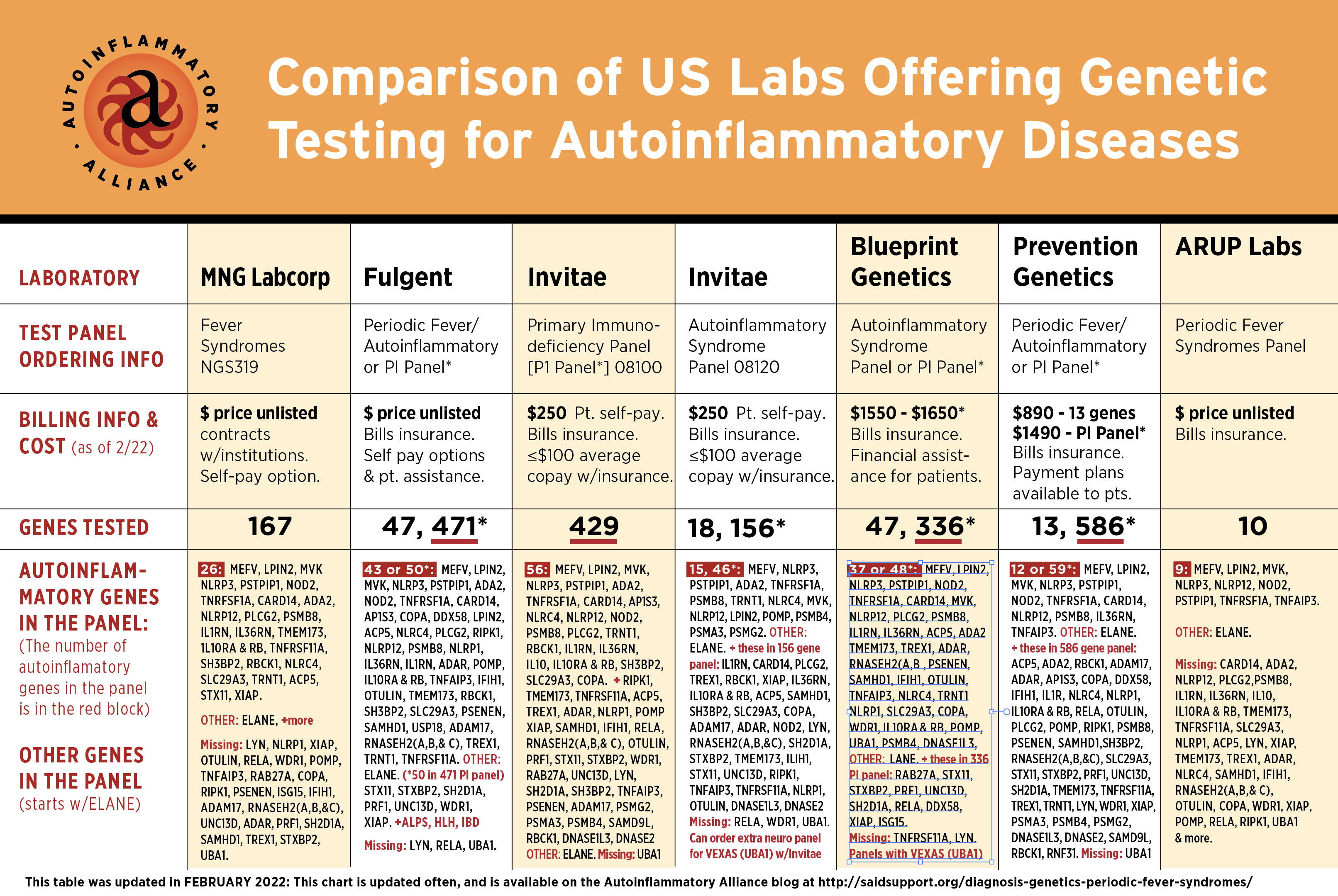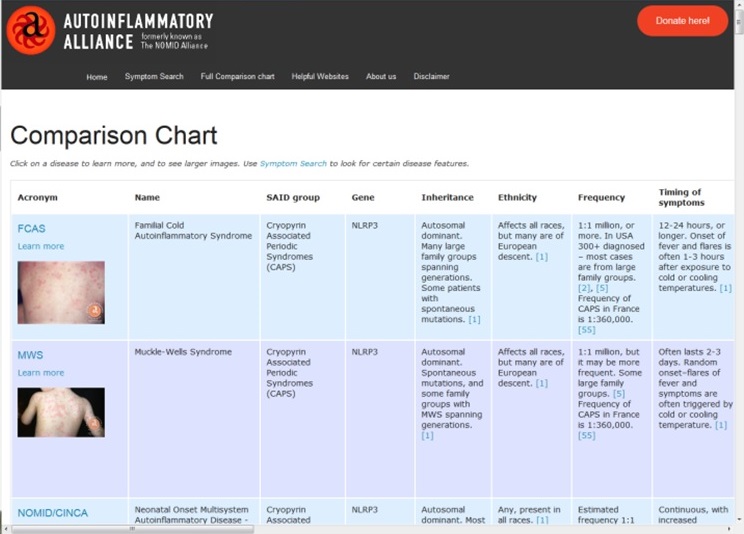Updated 8/29/2024
Diagnostic Tools for Autoinflammatory Diseases
Genetic testing and other resources for periodic fever syndromes diagnosis.

*Updates coming soon. As of 10/4/24 Invitae pricing will be incorrect. Links to the largest most comprehensive panels: Fulgent,
Blueprint Genetics, Prevention Genetics
Genetic Testing as a Diagnostic Tool
In Textbook of Autoinflammation published in 2019, Drs Ceccherini, Rusmini, and Arostegui state, “The importance of genetic tests to reach a definitive diagnosis has become evident during the past few years.” They also note that advancements in genetics, “has resulted in the increased awareness of the clinical diversity of these diseases, best therapeutic approaches and follow-up schemes for the patients…”
Since many of the autoinflammatory diseases share similar symptoms that may include recurrent high fevers, mouth ulcers, swollen lymph nodes, rashes, joint pain and/or swelling and other symptoms, running a genetic panel that tests for multiple syndromes at once is both efficient and cost effective. It also reduces the chances of missing the cause of the symptoms or missing comorbid conditions when an individual patient has genetics for multiple autoinflammatory diseases.
The most common fever syndrome PFAPA does not have a genetic test, but ruling out fever syndromes that can have similar symptoms, such as HIDS, CAPS, FMF, Behcet-like familial autoinflammatory syndrome (HA20) and TRAPS is important when diagnosing PFAPA. It’s been noted in research that, “A relevant number of patients with monogenic periodic fevers also meet the diagnostic criteria for PFAPA syndrome (Gattorno et al., 2008). In a preliminary experience, 83% of patients with MKD, 57% of patients with TRAPS, and 8% of patients with FMF satisfied the criteria for PFAPA syndrome.” Without genetic testing as part of the diagnosis these patients could easily be misdiagnosed and this may delay getting proper effective treatment.
Any doctor (including a pediatrician or primary care doctor) can order a genetic panel, and in the U.S. in most cases insurance will cover the costs of these tests as they are medical tests. But when needed, all labs have reasonable self-pay and payment plan options. Call the lab to find out your payment options. If you are outside the U.S., call the lab to find out the process for order a panel in your region.
Immune Dysregulation Genetic Panels Available
Several labs used in the U.S. and around the world have panels available that include periodic fever syndromes and other immune dysregulation syndromes, such as immune deficiencies, inflammatory bowel disease, and autoimmune conditions which can all have similar symptoms. These larger more comprehensive panels are typically found under a primary immune deficiency (PID) panel name. All use next generation DNA sequencing, are very accurate tests, and can be ordered by doctors around the world. You can call the lab to find out the process for your region.
Blueprint Genetics‘ primary immunodeficiency (PI) panel includes 336 genes with 48 genes associated with autoinflammatory diseases. Of the autoinflammatory diseases, and the panel includes UBA1. It is missing a few such as the TNFRSF11A (TRAPS11) and LYN genes. Their smaller Autoinflammatory panel has 37 autoinflammatory genes, , but the small and large panels do have TNFAIP3 in them. Blueprint offers payment programs for self-pay clients, and you would need to contact them for more details.
- Click here for the Blueprint Genetics 336 gene PI panel.
- Click here for Blueprint Genetics’ financial assistance program.
Prevention Genetics has improved their genetic testing options recently, and they offer a 586 gene Inborn Errors of Immunity/Primary Immunodeficiency (PID) Panel that has most of the autoinflammatory genes. It is missing UBA1, which is used to test for VEXAS. However, their 658 gene Primary Immunodeficiency and Lymphoid Malignancy Predisposition has UBA1 included, and includes all the PID panel plus other genes, including UBA1.
In addition, Prevention offers family testing, at no cost (conditions apply to panel tests, and other requirements) to family members that are blood relatives, if testing is done for the family member within 180 days for pathogenic, likely pathogenic, and uncertain variants. Visit their site for more details.
- Click here for the Prevention Genetics PID Panel
- Primary Immunodeficiency and Lymphoid Malignancy Predisposition has UBA1
Fulgent‘s immune dysregulation panel has 471 genes tested of which more than 40 genes are autoinflammatory. Some genes it does not include are the UBA1, LYN, RELA genes. You can add on their neuromuscular panel to get the UBA1 gene tested.
Fulgent has expanded their smaller, Periodic Fever/Autoinflammatory Disorders Panel to 47 genes, which is an improvement, but this smaller panel lacks many of the genes in the larger PI panel.
- Click here for the Fulgent Primary Immunodeficiency (PI) panel.
- Click here for the add on neuromuscular panel.
ARUP has one of the smallest panels, but it does include TNFAIP3, along with some of the basic autoinflammatory genes.
GeneDx (not listed at this time on our table above) is familiar to doctors, as they were the first to have genetic testing available, for autoinflammatory diseases in a small panel back as far as 2002 (or earlier), but they have continued to keep their Periodic Fever Syndromes 7 gene panel very small, and limited to 6 autoinflammatory genes, plus ELANE (cyclic neutropenia.) This test panel is the smallest now on the market, yet one of the most expensive. They are a reputable lab, as are the other labs on the table above.
A few of the small panels do not even have NOD2 (Blau syndrome, and others), NLRC4 or ADA2 (CECR1), and other more known autoinflammatory diseases.
Your doctor will review the symptoms, labs and assess for various features to decide on what panel may be best, but it is often a challenge to get genetic testing covered with insurance, so we tend to suggest that if you have one chance for genetics going for a larger panel allows you to test for the most syndromes for a lower cost than a small panel, but this is up to the doctor which panel gets ordered. If you are having to self-pay for genetics, then you may want to address this, as you are paying for it, and will want to get the most testing needed in one test.
Smaller Panels Can Miss Mutations for Newly Researched/Known Autoinflammatory Diseases
One of the reasons we have made the genetic labs table, and are addressing what is missing in the panels available at this time is due to some important diseases that are newer, but can present like more known periodic fever syndromes; it’s more helpful to the patient to get a genetic test that was inclusive of more of these conditions.
TNFAIP3, aka HA20 is one disease that can have ulcers thoughout the oral and even genital region, with presentations in childhood that can mimic other periodic fevers, but have a familial Behçets-like presentation, but with fevers and some other features that are not typical for classic Behçets, and is emerging as a condition with a range of presentations. The hope is that with more comprehensive testing, these patients, and others with some of the newly classified and emerging autoinflammatory and immunedysregulatory diseases may be noted with the bigger testing panels now offered.
RELA also involves systemic inflammation, oral and genital ulcers, ulcerations and inflammatory bowel disease, and other features, but can also present as a mimic of Behçets disease, and is in a few panels above, but mostly in the larger PI panels.
UBA1 has been recently associated with VEXAS syndrome. This gene is in the Blueprint Genetics Primary Immunodeficiency panel, and in the large Primary Immunodeficiency and Lymphoid Malignancy Predisposition Panel. But you can have an extra gene or panel added to the Invitae or Fulgent panels by ordering an add on test or neurmuscluar panel.
There are many other important genes in the PI panels that are autoinflammatory diseases, that may have some immunedysregulatory or immunodeficiency component that can present in some ways like other more known autoinflammatory diseases.
Some doctors are also not as aware of these other conditions, so a broader testing panel may help to lead doctors to consider these diseases, and targeted treatments. Doing a small panel can lead to delays in a diagnosis and treatment if these other diseases are missed, and it can be harder to get more genetic testing approved later after a small panel has been done, with no findings.
Using a primary immunodeficiency (PI) panel does bring in more data, but until there is a more comprehensive, stand-alone autoinflammatory focused panel that features all the autoinflammatory diseases in it, that is updated regularly, the PI panel may be the best way to get all the known autoinflammatory genes tested that are possible to be tested in a commercial lab panel for some patients.
But Whole Exome (WES) or Whole Genome (WGS) sequencing or other big genetic testing methods may also be more effective and beneficial for some patients. but have other distinct features, such as PRAAS/CANDLE. At this time, only PSMB8 and POMP are in some of these panels on the chart above, so if PRAAS is considered, expanded genetics for other mutations for that condition will need to be ordered separately, or a WES or WGS may be helpful.
For the unclassified autoinflammatory/periodic fever patients that may have some other findings, immunoglobulin levels that are atypical, compement or frequent infections, or presentations that are very difficult to sort out between an autoinfammatory and immune deficiency, or even an autoimmune disease, the PI panels can address all of this better than the smaller autoinflammatory-specific panels that only have one or a few PI genes, most often ELANE (cyclic neutropenia) that can present very much like a periodic fever syndrome, but it is an immune deficiency.
In our private patient communities of over 6,100 members, the PI panel has actually helped some undiagnosed patients to have been diagnosed with an immune deficiency, or conditions, such as ALPS that were not even on the “radar” for the doctors, but the genetic test led to more diagnostics, care, and treatment that has helped those conditions, so there are benefits.
And lastly, a genetic test is still very beneficial, even if no clear genetics are found for a patient. This can be used to lead to other testing, or WES or WGS, or to continue with treating the symptoms, and waiting for more genetic findings to arise, as there is so much more to be discovered.
There are a number of patients that still may remain as unclassified or undifferentiated autoflammatory disease (uSAID) patients, but genetics can help to reassure that all that was currently possible was looked into, and if needed, WES or WGS may be offered, but not all may need that.
Regardless of genetic results, diagnosis by symptoms, and finding beneficial treatments that help the patient are essential, as we wait for science to progress in this field, especially for genetics. It is important to not use a genetic panel that comes back with no clear findings as the defining test to conclude someone then “must be PFAPA” if they are presenting differently than the criteria for that disease. Clinical diagnosis is most essential.
A referral for complex, systemic inflammation cases may be needed, and more testing may be needed for some patients. Labs that do WES and WGS, and even the panel tests listed above now will report later to the doctor, or patient (depends on the lab), if there are updates and new findings discovered in genes that may have not been reported in the past, or if there are updates in their classification from the original report, so genetic testing today has a lot more benefits to the patient, even beyond the initial data, that may be inconclusive. And having genetics done for a patient, even if nothing is clearly defined from it can be used in the application process for a referral for programs like the Undiagnosed Diseases Network, the NIH, or other research centers if the patient is complex, or not responding to treatments as hoped.
 Systemic Autoinflammatory Diseases Database
Systemic Autoinflammatory Diseases Database
Edited and Co-authored by Autoinflammatory Alliance President Karen Durrant, RN BSN and leading experts on autoinflammatory diseases, this free online database describes the notable symptoms of currently known autoinflammatory syndromes. This database has become a highly respected and important diagnostic tool for doctors around the world. Since these diseases can be very similar and have overlapping symptoms, the chart can help narrow down which SAIDs to consider for a patient and can help guide further testing.
- Click here for the autoinflammatory online database.
- Click here for tips on using the autoinflammatory database.
Genetic Testing Registry
You can search this registry to find genetic testing available around the world here.
Finding Doctors
To find a doctor experienced with fever syndromes, contact the Autoinflammatory Alliance here.
We are trying to feature the most comprehensive panels for the widest number of classified autoinflammatory diseases available at this time, and have a limited area for the table. We are always on the lookout for more testing options, so please contact us for more suggestions.
Learn More About Genetic Testing
Blueprint genetics produced a series of informational webinars in their Blueprint Academy series that you can watch to learn more about genetics.
The 10/25/18 webinar Utility of genetic testing and application to immune-related disorders , a collaboration between the Autoinflammatory Alliance and Blueprint Genetics, features examples of autoinflammatory diseases.
Becoming an Empowered Patient: A Toolkit for the Undiagnosed
This kit put out by the Global Genes Project has everything you need to navigate the medical system when trying to find a diagnosis for any rare condition. It includes information on staying organized, how to talk to doctors, how to get your medical records, and much more.


